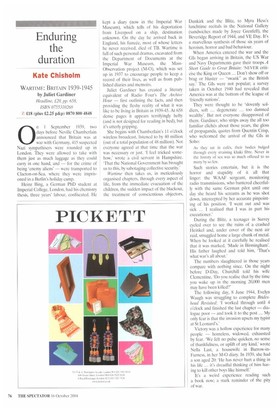Enduring the duration
Kate Chisholm
WARTIME: BRITAIN 1939-1945 by Juliet Gardiner Headline, £20, pp. 658, ISBN 0755310268 r) £18 (plus £2.25 p&p) 0870 800 4848 0 n 1 September 1939, two days before Neville Chamberlain announced that Britain was at war with Germany, 415 suspected Nazi sympathisers were rounded up in London. They were allowed to take with them just as much luggage as they could carry in one hand, and — for the crime of being 'enemy aliens' — were transported to Clacton-on-Sea, where they were imprisoned in a Butlin's holiday camp.
Heinz Bing, a German PhD student at Imperial College, London, had his chemistry thesis, three years' labour, confiscated. He kept a diary (now in the Imperial War Museum), which tells of his deportation from Liverpool on a ship, destination unknown. On the day he arrived back in England, his fiancée, most of whose letters he never received, died of TB. Wartime is full of such personal dramas, excavated from the Department of Documents at the Imperial War Museum, the MassObservation project (M-0), which was set up in 1937 to encourage people to keep a record of their lives, as well as from published diaries and memoirs.
Juliet Gardiner has created a literary equivalent of Radio Four's The Archive Hour — first outlining the facts, and then providing the fleshy reality of what it was like to be living in Britain in 1939-45. At 658 dense pages it appears terrifyingly hefty (and is not designed for reading in bed), but it's utterly gripping.
She begins with Chamberlain's 11 o'clock wireless broadcast, listened to by 40 million (out of a total population of 48 million). Not everyone agreed at that time that the war was necessary or just. 'I feel tricked somehow,' wrote a civil servant in Hampshire. That the National Government has brought us to this, by sabotaging collective security.'
Wartime then takes us, in meticulously organised chapters, through every aspect of life, from the immediate evacuation of the children, the sudden impact of the blackout, the treatment of conscientious objectors, Dunkirk and the Blitz, to Myra Hess's lunchtime recitals in the National Gallery (sandwiches made by Joyce Grenfell), the Beveridge Report of 1944, and VE Day. It's a marvellous synthesis of those six years of heroism, horror and bad behaviour.
When America entered the war and the GIs began arriving in Britain, the US War and Navy Departments gave their troops A Short Guide to Great Britain: 'NEVER criticise the King or Queen ... Don't show off or brag or bluster — "swank" as the British say.' The GIs were not popular; a survey taken in October 1940 had revealed that America was at the bottom of the league of 'friendly nations'.
They were thought to be 'slovenly sol diers, soft degenerate ... too damned wealthy'. But not everyone disapproved of them. Gardiner, who strips away the all too familiar clichés about those years, the gloss of propaganda, quotes from Quentin Crisp, who welcomed the arrival of the GIs in Soho:
As they sat in cafes, their bodies bulged through every straining khaki fibre. Never in the history of sex was so much offered to so many by so few.
Such stories entertain, but it is the horror and stupidity of it all that linger: the WAAF sergeant, monitoring radio transmissions, who bantered cheerfully with the same German pilot until one day she heard his screams as he was shot down, intercepted by her accurate pinpointing of his position. 'I went out and was sick ... I realised that I was in part his executioner.'
During the Blitz, a teenager in Surrey cycled over to see the ruins of a crashed Heinkel and, under cover of the next air raid, smuggled home a large chunk of metal. When he looked at it carefully he realised that it was marked, 'Made in Birmingham'. His father laughed and told him, 'That's what war's all about.'
The numbers slaughtered in those years compare with nothing since. On the night before D-Day, Churchill told his wife Clementine, 'Do you realise that by the time you wake up in the morning 20,000 men may have been killed?'
The following day, 8 June 1944, Evelyn Waugh was struggling to complete Brideshead Revisited: 'I worked through until 4 o'clock and finished the last chapter — dialogue poor — and took it to the post ... My only fear is that the invasion upsets my typist at St Leonard's.'
Victory was a hollow experience for many people — homeless, widowed, exhausted by fear. 'We felt no pulse quicken, no sense of thankfulness, or uplift of any kind,' wrote Nella Last, a housewife in Barrow-inFurness, in her M-O diary. In 1939, she had a son aged 20: 'He has never hurt a thing in his life ... it's dreadful thinking of him having to kill other boys like himself.'
It's a weird experience reading such a book now; a stark reminder of the pity of war.










































































































 Previous page
Previous page